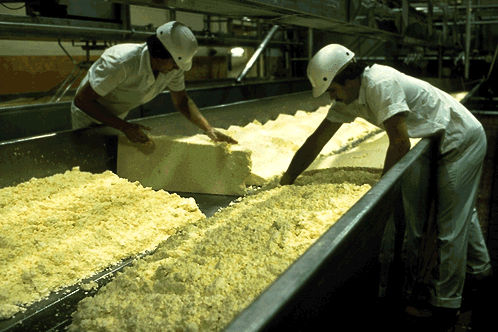Browse "Industry"
-
Article
Capital in Canada
In economics, capital traditionally refers to the wealth owned or employed by an individual or a business. This wealth can exist in the form of money or property. Definitions of capital are constantly evolving, however. For example, in some contexts it is synonymous with equity. Social capital can refer to positive outcomes of interactions between people or to the effective functioning of groups. Human capital refers to people’s experience, skills and education, viewed as an economic resource.
"https://d2ttikhf7xbzbs.cloudfront.net/media/new_article_images/EconomicsSummaries/dreamstimeextralarge_155310340.jpg" // resources/views/front/categories/view.blade.php
https://d2ttikhf7xbzbs.cloudfront.net/media/new_article_images/EconomicsSummaries/dreamstimeextralarge_155310340.jpg
-
Article
Capitalism in Canada
Capitalism is an economic system in which private owners control a country’s trade and business sector for their personal profit. It contrasts with communism, in which property effectively belongs to the state (see also Marxism). Canada has a “mixed” economy, positioned between these extremes. The three levels of government decide how to allocate much of the country’s wealth through taxing and spending.
"https://d2ttikhf7xbzbs.cloudfront.net/media/new_article_images/Capitalism/Railroading.jpg" // resources/views/front/categories/view.blade.php
https://d2ttikhf7xbzbs.cloudfront.net/media/new_article_images/Capitalism/Railroading.jpg
-
Article
Capitol Records - EMI of Canada Limited/Disques Capitol - EMI du Canada Limitée
Capitol Records - EMI of Canada Limited/Disques Capitol - EMI du Canada Limitée (Capitol Records of Canada Ltd 1947-54, Capitol Record Distributors of Canada Ltd 1954-8, Capitol Records of Canada Ltd again 1958-74).
"https://development.thecanadianencyclopedia.ca/images/tce_placeholder.jpg?v=e9dca980c9bdb3aa11e832e7ea94f5d9" // resources/views/front/categories/view.blade.php
https://development.thecanadianencyclopedia.ca/images/tce_placeholder.jpg?v=e9dca980c9bdb3aa11e832e7ea94f5d9
-
Macleans
Celtic Tiger
In Ireland, where the price of a pint is often a measure of prosperity, there is no greater gauge of the prevailing public mood than O'Donnell's pub.This article was originally published in Maclean's Magazine on August 21, 2000
"https://development.thecanadianencyclopedia.ca/images/tce_placeholder.jpg?v=e9dca980c9bdb3aa11e832e7ea94f5d9" // resources/views/front/categories/view.blade.php
https://development.thecanadianencyclopedia.ca/images/tce_placeholder.jpg?v=e9dca980c9bdb3aa11e832e7ea94f5d9
-
Article
Cement Industry
The Cement industry comprises establishments engaged in producing hydraulic cements, ie, cements which set and harden to a stonelike mass by reacting with water. The principal hydraulic cement is portland cement, a finely ground, usually grey, manufactured mineral product.
"https://development.thecanadianencyclopedia.ca/images/tce_placeholder.jpg?v=e9dca980c9bdb3aa11e832e7ea94f5d9" // resources/views/front/categories/view.blade.php
https://development.thecanadianencyclopedia.ca/images/tce_placeholder.jpg?v=e9dca980c9bdb3aa11e832e7ea94f5d9
-
Article
Chartered Banks in Canada
Chartered banks, sometimes known as commercial banks, are public corporations that are licensed by the federal government to operate a banking business within Canada (see Banking in Canada). By issuing these licenses (or charters), the Canadian government regulates and controls the country’s economy by influencing the amount, availability and distribution of money, and the terms or cost of accessing and distributing that money (interest rates). Chartered banks are regulated by the federal Bank Act and supervised by the Office of the Superintendent of Financial Institutions. Chartered banks in Canada accept deposits from the public and extend loans (such as mortgages) for personal, commercial, and other purposes. Banks also own and operate trust companies, securities dealers and insurance companies and offer such services as investment banking, international banking and more.
"https://d2ttikhf7xbzbs.cloudfront.net/media/media/e10ef17b-47be-467b-be0a-c69c2b7d62d2.jpg" // resources/views/front/categories/view.blade.php
https://d2ttikhf7xbzbs.cloudfront.net/media/media/e10ef17b-47be-467b-be0a-c69c2b7d62d2.jpg
-
Article
Cheese and Cheese Making
In Canada, 408,197 tonnes of cheese were produced in 2012; per capita consumption was 12.18 kg, consisting of 3.9 kg of cheddar, 7.54 kg of mozzarella and other specialty cheeses, and 0.74 kg of cottage cheese.
"https://d2ttikhf7xbzbs.cloudfront.net/media/media/30e71a21-76ef-49e2-8af0-a655ed30b042.jpg" // resources/views/front/categories/view.blade.php
https://d2ttikhf7xbzbs.cloudfront.net/media/media/30e71a21-76ef-49e2-8af0-a655ed30b042.jpg
-
Article
Chemical and Chemical Products Industries
Chemical manufacturing entails the conversion of one material to another by a chemical reaction on a commercial scale. The starting material (feedstock) can be a natural substance or a relatively pure chemical used as an "intermediate" for subsequent upgrading.
"https://development.thecanadianencyclopedia.ca/images/tce_placeholder.jpg?v=e9dca980c9bdb3aa11e832e7ea94f5d9" // resources/views/front/categories/view.blade.php
https://development.thecanadianencyclopedia.ca/images/tce_placeholder.jpg?v=e9dca980c9bdb3aa11e832e7ea94f5d9
-
Article
CHUM Limited
CHUM Limited, controlled by Allan Waters, and headquartered in Toronto, is one of Canada's largest radio and television broadcasting holding companies.
"https://development.thecanadianencyclopedia.ca/images/tce_placeholder.jpg?v=e9dca980c9bdb3aa11e832e7ea94f5d9" // resources/views/front/categories/view.blade.php
https://development.thecanadianencyclopedia.ca/images/tce_placeholder.jpg?v=e9dca980c9bdb3aa11e832e7ea94f5d9
-
Macleans
CIBC-TD Merger
This article was originally published in Maclean’s magazine on April 27, 1998. Partner content is not updated. This time, Paul Martin kept his cool. Last January, the Bank of Montreal and Royal Bank announced plans to merge and create one superbank, with assets of $453 billion.
"https://development.thecanadianencyclopedia.ca/images/tce_placeholder.jpg?v=e9dca980c9bdb3aa11e832e7ea94f5d9" // resources/views/front/categories/view.blade.php
https://development.thecanadianencyclopedia.ca/images/tce_placeholder.jpg?v=e9dca980c9bdb3aa11e832e7ea94f5d9
-
Macleans
Cinar Scandal
This article was originally published in Maclean’s magazine on March 20, 2000. Partner content is not updated. As first days at the office go, it was the most bizarre in Peter Moss's career. On March 6, he reported for his first day as president of entertainment for Montreal-based children's TV programmer Cinar Corp. Moss arrived to find "the whole place had been turned upside down," he recalls.
"https://development.thecanadianencyclopedia.ca/images/tce_placeholder.jpg?v=e9dca980c9bdb3aa11e832e7ea94f5d9" // resources/views/front/categories/view.blade.php
https://development.thecanadianencyclopedia.ca/images/tce_placeholder.jpg?v=e9dca980c9bdb3aa11e832e7ea94f5d9
-
Article
CINARS
CINARS International Exchange for Performers/Conférence, then Commerce international des arts de la scène. Event promoting the performing arts, which was founded in Montreal in 1983 by Alain Paré, who was vice-president and director general in 1991.
"https://development.thecanadianencyclopedia.ca/images/tce_placeholder.jpg?v=e9dca980c9bdb3aa11e832e7ea94f5d9" // resources/views/front/categories/view.blade.php
https://development.thecanadianencyclopedia.ca/images/tce_placeholder.jpg?v=e9dca980c9bdb3aa11e832e7ea94f5d9
-
Article
Clothing Industries
Mass production of clothing in Canada began in the mid-19th century in urban centres, which supplied pools of semi-skilled labour and were the major consumer markets.
"https://development.thecanadianencyclopedia.ca/images/tce_placeholder.jpg?v=e9dca980c9bdb3aa11e832e7ea94f5d9" // resources/views/front/categories/view.blade.php
https://development.thecanadianencyclopedia.ca/images/tce_placeholder.jpg?v=e9dca980c9bdb3aa11e832e7ea94f5d9
-
Macleans
CN Back on the Rails
"The guy was working full time on GM's property and he was driving a Ford," Paul Tellier sputters, his native French bending vowels as he delivers the punch line to his anecdote.This article was originally published in Maclean's Magazine on January 13, 1997
"https://development.thecanadianencyclopedia.ca/images/tce_placeholder.jpg?v=e9dca980c9bdb3aa11e832e7ea94f5d9" // resources/views/front/categories/view.blade.php
https://development.thecanadianencyclopedia.ca/images/tce_placeholder.jpg?v=e9dca980c9bdb3aa11e832e7ea94f5d9
-
Macleans
CN Cuts 3,000 More Jobs
This article was originally published in Maclean’s magazine on November 2, 1998. Partner content is not updated. Necessary downsizing or corporate greed? Canadian National Railway Co.s announcement last week of plans to slash 3,000 jobs quickly prompted those diametrically opposed views. CN executives said the cuts were required to make the company more competitive.
"https://development.thecanadianencyclopedia.ca/images/tce_placeholder.jpg?v=e9dca980c9bdb3aa11e832e7ea94f5d9" // resources/views/front/categories/view.blade.php
https://development.thecanadianencyclopedia.ca/images/tce_placeholder.jpg?v=e9dca980c9bdb3aa11e832e7ea94f5d9
